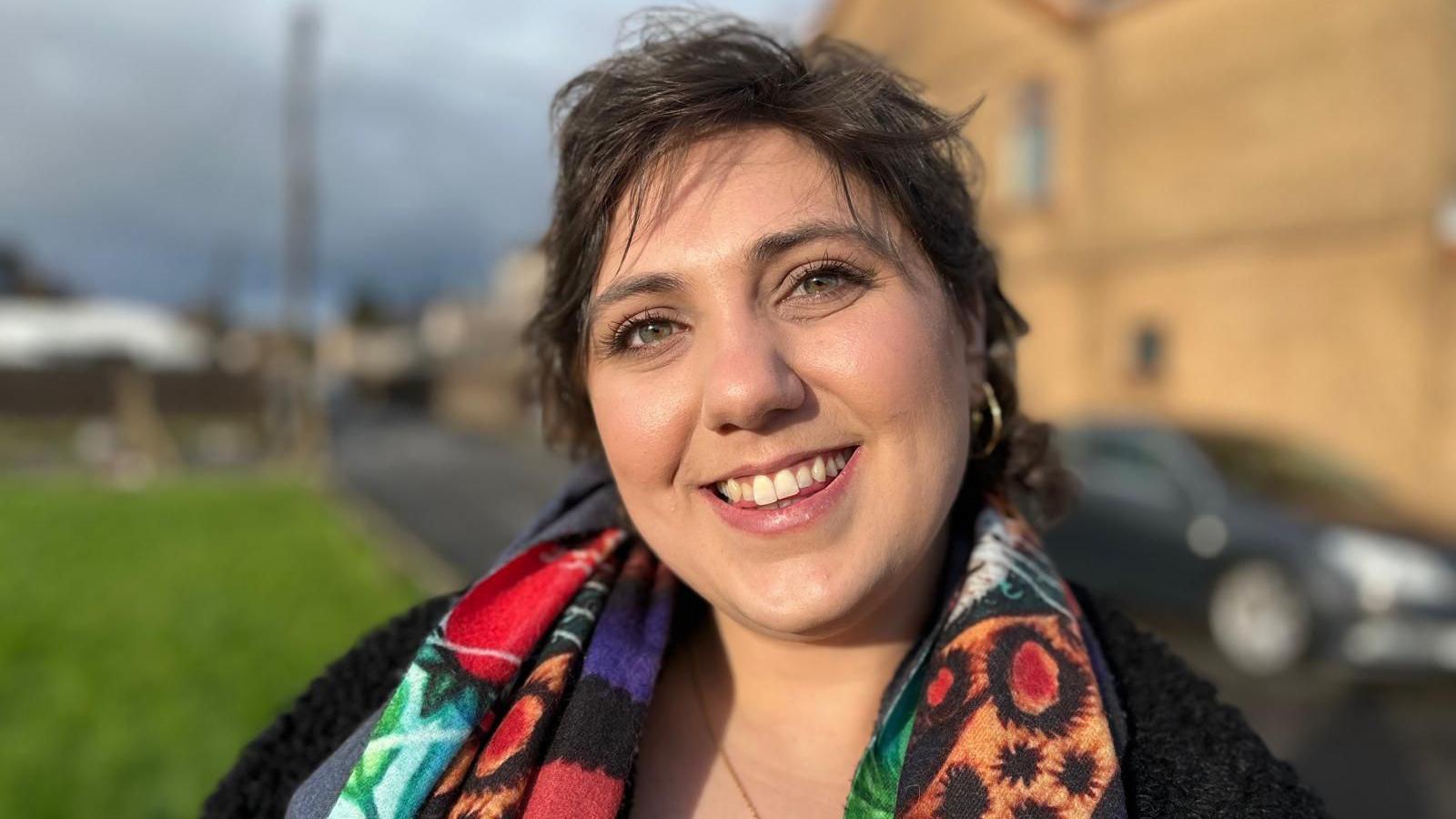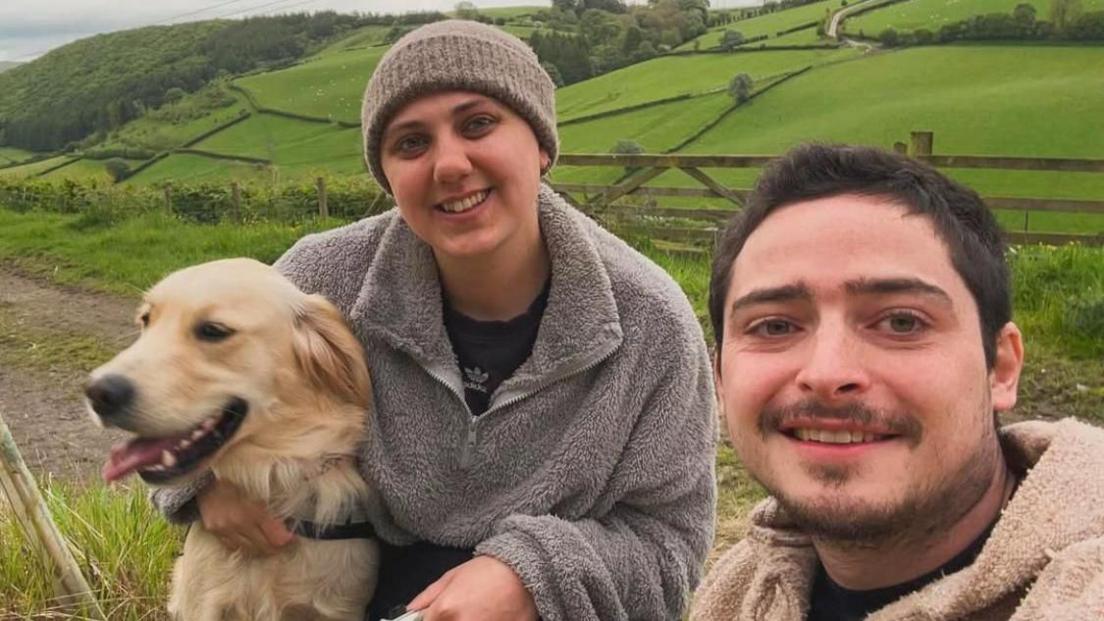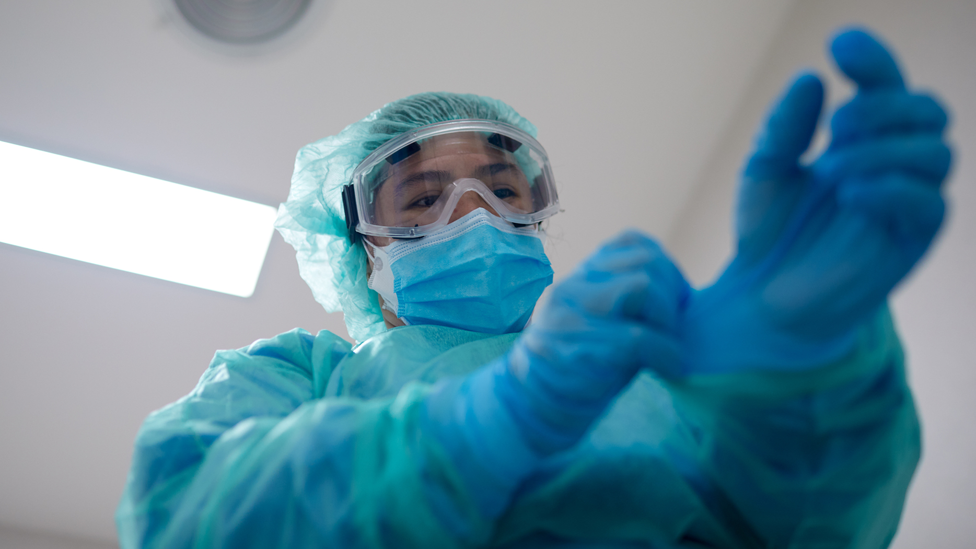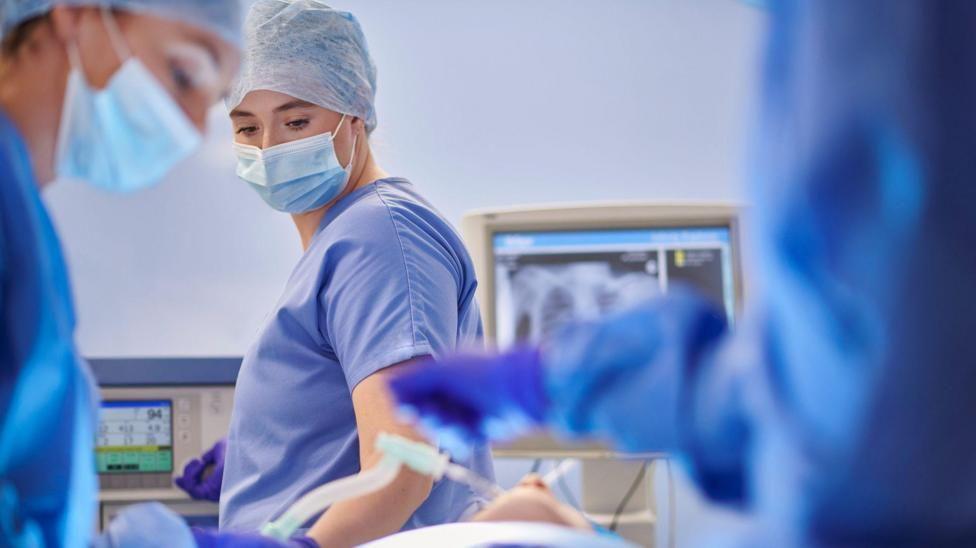Cancer bosses meant to improve NHS 'making it worse'

Bethan waited nearly eight months for a referral when she found a lump in her breast
- Published
A damning report into cancer services in Wales has found confusion, lack of clarity and duplication at a leadership level, prompting some to complain "we don't know who is in charge".
With progress stalled as a result, cancer survivor Bethan Mansell said it was "worrying that great strides forward were not being made".
Increased investment has not made a difference to the ongoing failure to meet national targets, where some patients wait more than 100 days for treatment, the report found.
Audit Wales said clearer national leadership was urgently needed, while the Welsh government said it was working with the NHS to improve access and leadership was being revised to provide stronger direction.
Welsh patients may wait longer for care in England
- Published10 January
Dental care 'critical' amid mouth cancer increase
- Published13 November 2024
Cancer waiting times branded a crisis
- Published21 April 2024
Ms Mansell, 29, from Port Talbot, waited nearly eight months for a referral when she found a dimple in her breast in the summer of 2022.
She feels her treatment may not have needed to be so aggressive had the cancer been found sooner, though is thankful she is now cancer-free.
Delays are a factor across Wales, as no health board has been able to meet the goal of 75% of patients starting treatment within 62 days since August 2020.
The audit report said the pace of regional collaboration had also been slow.
Waiting times for some cancers like gynaecological and urological were particularly long, with some waiting more than 100 days before starting treatment.
The report flagged competing political and policy demands, as the same NHS services are required to tackle cancer delays and lengthy waiting times.
For patients any delay can heighten anxieties. Ms Mansell had to put wedding plans on hold, along with a promotion at work.
"If the delays hadn't happened, I do think 'what if?' and I know I shouldn't ponder on that, but it does make you wonder where you would be in life.
"To see my friends getting married, having babies, and colleagues getting promotions, leap-frogging me - seeing all of that happen while going through the treatment was really tough.
"You just have to remind yourself this isn't forever."

Ms Mansell says she is now cancer-free but feels the treatment she had may not have needed to be so aggressive had the cancer been found sooner
As the leading cause of death in Wales, the report has said early detection is key as 38% of cancers are preventable.
Despite prevention being a "long-standing ambition" of the Welsh government, auditors felt that was yet to be translated into "concrete and cohesive policy initiatives".
Cuts to this year's budget for preventative health improvements have also been criticised by the Future Generations Commissioner.
While the bowel screening programme has been expanded and uptake was good, that was not the case for breast and cervical screening. HPV vaccine take-up was also variable.
A decision was yet to be made about lung screening, despite a successful pilot and a 2022 recommendation from the UK National Screening Committee for all UK nations to develop a service.
The Welsh government has been urged by auditors to "clarify as soon as possible whether it will fund national lung screening for Wales".
Cancer survival rates have improved, but were still poorer than other countries and worse in the more deprived parts of Wales.
Currently there was "considerable variation and fluctuation" in performance between health boards and the report called for better regional work between health boards.
But without strategic leadership enforcing this collaboration, progress is slow.
The report also set out the important context of increasing demand on services, with 22% more new cancers detected over the last two decades.
Head of cancer charity Tenovus, Judi Rhys said the report "must serve as a wakeup call".
"By 2030, its estimated 230,000 people will be living with cancer in Wales. These issues will only worsen if we fail to act now."
Gaps in data also "understate" the sheer volume of increasing work already being done by cancer services. Information about the first treatment was counted, but not the multiple episodes of care or increasing complexity of treatment like immunotherapy.
Spending on cancer has increased in real terms by 54% over the past 13 years and stood at £719m in 2022-23. However, the increased cost of drugs and new treatments meant those financial injections had not led to increased capacity, auditors found.
Gaps in the workforce and concerns about a shortage of modern scanners had also impacted the NHS's ability to increase activity.
'Confusion'
Various plans, statements and programmes have been drawn up by both Welsh government and the NHS, which Audit Wales acknowledged showed a commitment to improve cancer services.
However, the report paints a picture of confusion over how these are implemented.
The creation of a new body - the NHS Executive - has prompted some within the sector to view arrangements as "worse than ever".
The body was set up in 2023 to provide "strong leadership and strategic direction", to allow the health service to "transform clinical services".
But auditors said confusion over the roles of Welsh government and the NHS Executive had undermined those efforts.
A cancer improvement plan was also drawn up in 2023 by NHS Wales cancer leaders - collectively known as the Cancer Network - at the request of the then health minister.
But the audit report highlighted a gap: the Welsh government did not view it as a government plan, despite the need for national direction, finances and leadership to implement it - something the network does not have the authority to do.
Auditors have now called for clarity over national roles and responsibilities and how NHS bodies would be held to account for poor data compliance.
More data required
The report contains a strong call for more publicly available data, including:
A breakdown of how long patients wait for diagnostic reporting, surgery and radiotherapy
Diagnosis and treatment of recurrent disease - an issue which has long been raised by campaigners
The numbers currently waiting for cancer diagnosis or treatment (rather than simply those who have started treatment within 62 days)
Where patients live, as well as where they are treated (patients in Powys are treated out of county)
Timeliness of diagnosis and treatment for those referred from breast and cervical screening programmes
Patient ethnicity data (over two thirds of records are incomplete, despite this being a requirement)
Data on children and young people (currently anyone under-30 is grouped together)
Why are waits so long?
The time many patients wait for their first scan or test has actually fallen.
However, depending on the type of cancer, patients will then have a further wait between the test and the result.
Auditors have said the problem arises between diagnosis and starting treatment and delays are worse for lower gastrointestinal and breast cancers than other types.
While £3.4m has been spent by Welsh government on a National Imaging Academy, to train more radiologists and address a workforce shortage, auditors found that some NHS bodies have not been able to create jobs to take on those newly trained staff.
The Welsh government said it was "committed to improving cancer services in Wales".
"We are absolutely focused on working with the NHS to improve access to diagnosis and treatment as part of our target for 75% of those diagnosed to begin treatment within 62 days of when their cancer is first suspected.
"We are also revising our national cancer leadership arrangements to provide a clearer and stronger direction for cancer improvement."
Related topics
- Published21 November 2024

- Published21 November 2024

- Published19 November 2024
